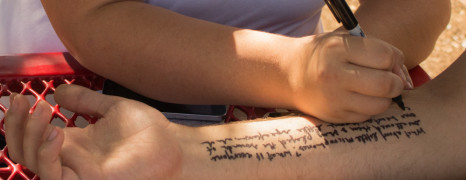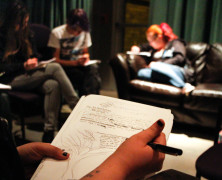The Student Writers Association (SWA) held its first meeting of the school year last week, and with it began another year of quirky innovations in the art of writing. The coming semesters promise another mixed bag of surprises from the group, which delights in denying conventions. As a member of SWA myself, I decided to step out of the objective view of a reporter and bring some of the spirit of the group to our interviews. I ask each of my colleagues to bring their favorite book with them. Our assignment? To flip through the pages and find a word or phrase that describes each member of SWA. What follows is an act of literary communion, wielding dangerous Sharpies and filled with ink-splotched abandon. Melinda Freudenberger “That crazy bastard may be the only sane one left.” —Catch-22 When I meet up with Melinda Freudenberger on the Quad, she is smoking a cigarette under a tree. I ask her what’s on the horizon for SWA this year. “We’re planning a lot of cool open mics,” she says, and recalls watching a video of a band performing in a cave. While there are no caves in the Santa Fe area, she says we can expect some unusual locations for open mics. “We’re planning on streamlining Coffee Spoons,” Freudenberger says of SWA’s literary magazine. Coffee Spoons began last year as a monthly, online publication, culminating in the release of a limited, physical copy at the end of the spring semester. After struggling to receive submissions to the magazine, SWA has decided to work with students who attend their meetings to produce pieces for publication. Issues of Coffee Spoons will then be released at the end of each semester. Freudenberger believes that the group’s past difficulty in receiving submissions can be linked to students’ insecurities. “I equate this with open mic anxiety,” she says. “I share the feeling of not having something to read at an open mic or not feeling comfortable having my work published. Publication is put on a pedestal and it doesn’t need to be like that.” Coffee Spoons serves as an entry-level publication for students, but that doesn’t mean that all work is accepted. Freudenberger credits her acceptance into SFUAD’s annual literary journal, Glyph, as giving her the confidence to submit to outside publications. “You can be rejected from Coffee Spoons,” Freudenberger says, “but it exists as proof that you can be published.” SWA has not always been so innovative and fun. In fact, Freudenberger says, “It was pretty shitty. The first meeting I went to, the seniors just talked at us. They told us to bring work in and they’d workshop it, but nobody ever did.” Freudenberger recalls a lack of warmth. “There wasn’t as much encouragement to new students to read as there is now. It felt closed off.” This lack of community served as the impetus for change. Creative Writing faculty member Dana Levin was instrumental in finding new recruits. She pulled Freudenberger aside one day, along with Amaya Hoke, Marina Woollven and Nik Thomas. Levin took them by surprise when she addressed them as SWA. “That’s when things started to change,” Freudenberger says. “We had to stop and consider whether or not we actually cared about it, and if we did, how could we make it better?” The group was strengthened last year by then-seniors Brandon Brown and Bailey Schaumburg. They provided the warmth that was missing. Schaumburg took charge of organizing the open mics. Brown made a conscious effort to mentor the underclassmen, grooming them to take over after he graduated. “We were really excited about it,” Freudenberger says, “but also a little nervous.” This is Freudenberger’s second year as a board member of SWA. The work is not without its stress. So much time gets put into organizing events that board members don’t always get to see the benefits of their work. But every once in a while, there is proof that the...
Hangin’ w/ SWA
posted by Nick Martinez
Twelve writers sat in a circle on couches or chairs, under dim lighting. They chatted about classes, favorite authors, weird things they wrote or wanted to write. Student Writers Association’s Jan. 27 meeting resembled a coffee shop more than a classroom. “The quiet, comfortable atmosphere is what makes this group so successful,” said Creative Writing major Amaya Hoke. She noted that part of the growing success of the often ramshackle organization was the switch from a boring Benildus classroom to the O’Shaughnessy Performance Space. Senior Brandon Brown has attended every SWA meeting, seeing his role as more of an advisor than a president. “This is about building a foundation,” he said when asked about the group’s goals. Of the 12 in attendance, most were underclassmen, a demographic that is key to establishing the group’s future. The laid-back vibe of the meeting is deliberate. Brown saw that establishing a connection with other writers, who are usually a solitary lot, is just as important as any craft exercise. “You can make friends. You’ll see someone walking in the hallways and say, ‘Hey, I know that person, because I hang out with them for two hours every Tuesday night,” he said. “I feel like it works. [The meetings are] always easy, it never feels like a chore.” Missing the intellectual stimulation, recent graduate Curtis Mueller started attending meetings last November. “We’re really spoiled here,” he said. “Here, people are talking about things they actually want to do. Out in the real world they just want to talk about stupid bullshit.” Though the group is informal, Hoke organizes a writing exercise every meeting meant to remove the writers from their comfort zone. Some are structurally complicated, like a three paragraph flash piece that changes genres each paragraph. Others...



 Jackalope Magazine is the student magazine of Santa Fe University of Art and Design. Building on the interdisciplinary nature of our education, we aim to showcase the talent of our university and character of our city.
Jackalope Magazine is the student magazine of Santa Fe University of Art and Design. Building on the interdisciplinary nature of our education, we aim to showcase the talent of our university and character of our city.
Recent Comments